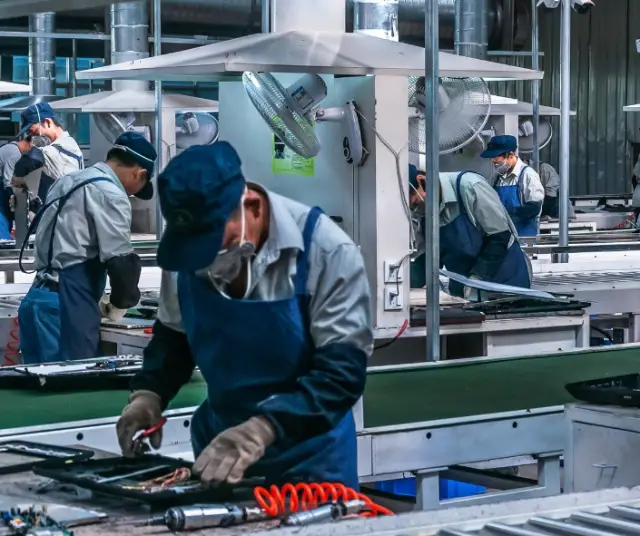Workers' Day in Chile is a celebration that goes beyond a simple holiday. It is a date full of history, meaning and reflections on labor rights and the importance of the workforce in building a fair and equitable society.
Origins and Historical Context
The origins of Worker's Day in Chile are closely linked to the emergence of the workers' struggle during the turbulent period of the Industrial Revolution. At the end of the 19th century, industrialization was expanding rapidly, leading to a radical transformation in working conditions. In this context, Chilean workers found themselves immersed in exhausting work hours, unfair salaries, and precarious work environments.
The emergence of factories and the consolidation of industrial sectors such as mining marked the beginning of a collective consciousness among workers. The need to organize and demand better working conditions became an urgent reality. Unions and labor associations emerged that sought to represent and defend the rights of workers in the face of the deplorable conditions they faced.
It is in this context that the workers' struggle takes center stage in Chile , with the voice of the workers being the driving force behind the first demands for the dignity of working conditions. The first demonstrations and protests took place in an atmosphere of discontent and inequality, marking the foundations of a struggle that would endure in the country's history.
The tragic Massacre of the Santa María School in 1907 becomes a painful but determining milestone at this stage. The violent repression of a workers' demonstration, where police opened fire on the crowd, resulted in the loss of lives of numerous workers. This event, far from discouraging the struggle, strengthened unity among workers and generated a feeling of solidarity that would become an essential component of the Chilean labor movement.
The period prior to the institutionalization of Labor Day was marked by tenacious working class resistance. Chilean workers, aware of their collective power, continued to organize and push for fairer working conditions. The union struggle and demonstrations multiplied, creating a climate of mobilization that could not be ignored by the authorities.
Finally, on May 1, 1931, during the administration of Carlos Ibáñez del Campo, Workers' Day was made official as a national holiday in Chile. This official recognition not only commemorated the historical struggle of workers, but also established a date to reflect on labor rights and the essential role that the workforce plays in the construction and development of the Chilean nation.
The Santa María School Massacre
The Santa María School Massacre, which occurred on December 21, 1907, stands as a dark chapter in the history of the Chilean workers' struggle, but at the same time, as a breaking point that catalyzed greater solidarity and determination among the workers of the country.
In this context, the incipient fight for labor rights was in full development. The Industrial Revolution had introduced significant transformations in working conditions, generating growing dissatisfaction among Chilean workers. Lack of labor regulations and lack of fundamental rights led to grueling work hours, low wages, and dangerous work environments.
The Santa María School, located in Santiago, witnessed an episode that would change history. During a workers' demonstration near the school, the police opened fire indiscriminately on the crowd, resulting in the deaths of numerous workers. This act of disproportionate violence, known as the Santa María School Massacre, sent shock waves through Chilean society and marked a before and after in the workers' struggle.
The Institutionalization of Labor Day
On May 1, 1931, during the government of Carlos Ibáñez del Campo, Workers' Day was officially established as a national holiday in Chile. This decision was a recognition of the historical struggle of workers for fairer working conditions and laid the foundations for the protection of their rights. Since then, every year, the country immerses itself in various activities to commemorate and reflect on the fundamental role of the workforce in the development of the nation.
Challenges and Advances in the 20th Century
Throughout the 20th century, Chile experienced political, social and economic changes that directly impacted labor rights. During the dictatorship of Augusto Pinochet (1973-1990), policies were implemented that negatively affected workers, including the suppression of unions and labor flexibility. However, resistance and struggle persisted even in the most difficult times.
With the return to democracy in 1990, a period of institutional reconstruction began and laws were enacted to strengthen the protection of labor rights. Unions were reestablished and measures were implemented to improve working conditions. However, challenges persist such as wage inequality, job insecurity and lack of adequate representation in some sectors.
Today, Workers' Day in Chile is celebrated with a mix of commemorative events, demonstrations and reflections on achievements and pending challenges. Unions, labor organizations and society in general participate in activities ranging from peaceful marches to seminars and debates on relevant labor issues.
Globalization and changes in the world economy present new challenges for Chilean workers. Adaptation to the digital age, process automation and transformations in the nature of work raise questions about the future of employment and the need to update labor laws to meet these emerging challenges.
In the current context, it is crucial to reflect on the future of work in Chile. The incorporation of disruptive technologies, the need for continuous training and the creation of sustainable jobs are issues that must be addressed comprehensively. The active participation of workers in decision-making and the construction of inclusive labor policies is presented as a prevailing need.
Additionally, the COVID-19 pandemic has highlighted the importance of ensuring safe working conditions and implementing policies that protect workers in crisis situations. Solidarity and collaboration between employers, workers and the government are essential to overcome current and future challenges.
